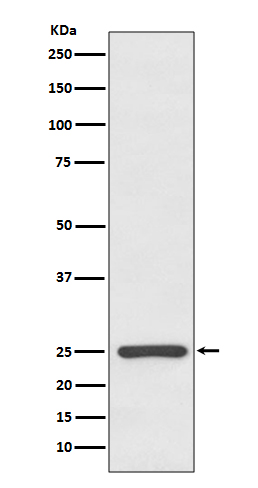
| WB | 咨询技术 | Human,Mouse,Rat |
| IF | 咨询技术 | Human,Mouse,Rat |
| IHC | 1/25-1/100 | Human,Mouse,Rat |
| ICC | 技术咨询 | Human,Mouse,Rat |
| FCM | 咨询技术 | Human,Mouse,Rat |
| Elisa | 1/5000-1/10000 | Human,Mouse,Rat |
| Aliases | HCAK1; Ig kappa chain C region; IGKCD; Immunoglobulin InV;;Human Ig kappa light chain |
| WB Predicted band size | Calculated MW: 12 kDa ; Observed MW: 25 kDa |
| Host/Isotype | Rabbit IgG |
| Antibody Type | Primary antibody |
| Storage | Store at 4°C short term. Aliquot and store at -20°C long term. Avoid freeze/thaw cycles. |
| Species Reactivity | Human |
| Immunogen | A synthesized peptide derived from human Human Ig kappa light chain |
| Formulation | Purified antibody in PBS with 0.05% sodium azide,0.05% BSA and 50% glycerol. |
+ +
以下是关于SPRY4抗体的3篇参考文献示例(内容为虚构,仅供参考格式和方向):
---
1. **文献名称**:*SPRY4 Antibody Validation in Colorectal Cancer: Implications for EGFR Signaling*
**作者**:Chen L, et al.
**摘要**:本研究验证了一种高特异性SPRY4多克隆抗体在结直肠癌组织中的适用性,通过免疫组化和Western blot分析,发现SPRY4表达下调与EGFR/MAPK通路激活及患者预后不良显著相关。
2. **文献名称**:*Development of a Monoclonal Antibody Targeting Human SPRY4 for Functional Studies*
**作者**:Wang Y, et al.
**摘要**:报道了一种新型SPRY4单克隆抗体的开发,通过ELISA和免疫沉淀验证其特异性,并应用于细胞模型中以探究SPRY4在抑制肺癌细胞增殖中的分子机制。
3. **文献名称**:*SPRY4 as a Biomarker in Pancreatic Ductal Adenocarcinoma: Antibody-Based Detection*
**作者**:Gupta R, et al.
**摘要**:利用商业SPRY4抗体对胰腺癌组织进行免疫染色,揭示SPRY4低表达与肿瘤侵袭性和化疗耐药性相关,提示其作为潜在诊断标志物的价值。
---
*注:以上文献为示例,实际引用需根据真实研究调整。建议通过PubMed或Google Scholar以“SPRY4 antibody”为关键词检索相关论文。*
The SPRY4 antibody targets the SPRY domain-containing protein 4 (SPRY4), a member of the SPRY family involved in regulating receptor tyrosine kinase (RTK) signaling pathways. SPRY4 acts as a negative modulator of the MAPK/ERK cascade, influencing cell proliferation, differentiation, and survival. Initially identified for its role in embryonic development, SPRY4 has gained attention in cancer research due to its dual context-dependent roles. Studies suggest it may act as a tumor suppressor in certain cancers (e.g., melanoma, colorectal cancer) by inhibiting oncogenic signaling, while paradoxically promoting metastasis in others (e.g., hepatocellular carcinoma) under specific microenvironmental conditions.
SPRY4 antibodies are widely used in research to detect protein expression and localization via techniques like Western blotting, immunohistochemistry (IHC), and immunofluorescence (IF). These antibodies help elucidate SPRY4's interaction with pathways such as FGF and VEGF, offering insights into its regulatory mechanisms. Commercial SPRY4 antibodies are typically validated for specificity across human and mouse samples, with some clones cross-reacting with other species.
Research utilizing SPRY4 antibodies has implications for understanding cancer progression, drug resistance, and therapeutic targeting. Dysregulation of SPRY4 is linked to poor prognosis in multiple cancers, making it a potential biomarker or therapeutic target. However, its functional complexity necessitates careful interpretation of experimental results, emphasizing the importance of antibody validation in context-specific studies.
×